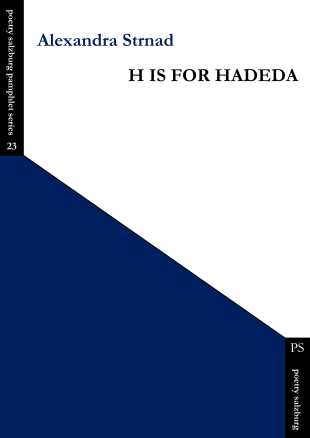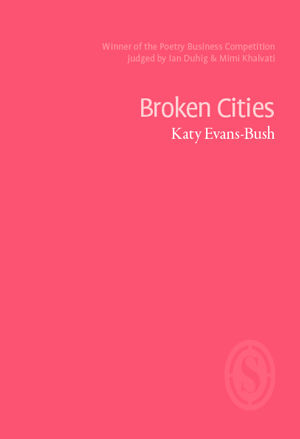

Alexandra Strnad, H is for Hadeda (Poetry Salzburg, 2017), 35pp, £6.00.
Katy Evans-Bush, Broken Cities (smith | doorstop, 2017), 34pp, £5.00.
And the fury is there:
a dark pip in an old fruit,
through the years it has
spoken to me…– from ‘Prayer’
These lines, rising like a spell from Alexandra Strnad’s finely-wrought volume (H is for Hadeda), sum up with incisive grace the project that both award-winning poets – in their respectively brilliant ways – have chosen for themselves: to face up to the fury that has come to shape their worlds and ours; and, like clear-eyed physicians, to take its pulse, or (even better) locate its source. While Strnad does so by observing the landscapes around her with hawk-eyed precision, Katy Evans-Bush experiments deftly with the rhythms of contemporary language to unearth our buried hurts and grievances.
H is for Hadeda begins on the streets of Prague, where the precocious geographies of growing up (a vivid afternoon in Vinohrady, dusky flirtations at the Café Meduza) are layered over childhood landmarks. But the pamphlet’s vista soon expands to take in landscapes that the poet conjures, imagines, or knows vicariously: we follow her homesick grandmother, for instance, through the ‘shuttered rooms’ of wartime Hyderabad, a young woman trapped in the colonial heat and ‘dream[ing] of coldness’ (‘Hyderabad, 1943’). It is on these tentative excursions – into the past, into dreamed elsewheres – that we learn something of the melancholy that structures the present. Watching women gathering kelp at dawn, their voices and faces concealed by their work, Strnad muses on what else we do not know, like submarine ‘portholes that we leave closed / to sleep sounder, to remain unmoved’ (‘Kelp’). And lost between two histories on a static afternoon in the Lodi Gardens, she realizes that even when time seems (frustratingly) suspended, ‘there must be sweetness in that life’ (‘Waiting in Lodi Gardens’).
If some poems seem to lose themselves in these close observations, it is because the devil, for Strnad, is in the details. How are we to taste Dubai’s dull extravagance without watching, through her eyes, as a ‘fountain gleeks gallons of airborne water’ into the night, or seeing the Burj’s spire (‘half goth, / half plant’) in all its lit and ugly glory (‘The Burj’)? The pieces in the latter half of the pamphlet are more supple and formally varied, delivering the sting in each full-colour snapshot with a precise grasp of the length and weight of each line. They coalesce around the Gulf (where Strnad is now based) and – perhaps gesturing to the poet’s own migrations – around themes of flight (‘H is for Hadeda’, ‘The Falcon’, ‘Skydivers’); each setting out to reclaim the beauty and dread of an expansive desert sky from our news images of oil-fuelled wealth and anonymous, drone-inflicted violence.
Evans-Bush’s Broken Cities takes us in the other direction: around the streets and neighbourhoods we know best, in a quest to unsettle the familiar. From its first line, the opening poem (‘Don’t Look Down’) upends an innocuous fairground ride, allowing the end-rhymed lines of wildly varying lengths to approximate the unpredictable, yet mysteriously consonant quality of urban reality itself:
…you are mysteriously alone in your roller coaster car,
alone behind the locked locked locked locked bar,
and now there is probably a clown.
I said: don’t look down.
The poet’s cities are ‘broken’ because they are mad and high-strung with the forces of age and rage, but also ‘broken’ in the same way that her lines are: deliberately abandoned, then salvaged; layers of meaning carefully folded into themselves. In ‘Wise Guys Lounge’, the slowed-down interior of an older person’s house is figured as an almost alien landscape: ‘Here dust, receipts, bags […] settle into a sedimentary / post-apocalyptic stillness’. It seems a shocking, almost cruel comparison – until we realize how often (how easily!) we remove ourselves from the lives of the aged, those for whom the disasters we dare not name have indeed taken place. Other poems, like ‘Prior Bolton’s Oriel Window’, raid the past for a nuanced critique of new myths: in pointedly contemporary language, we are prompted to ‘have a think’ about the age-old confluences of power, technology, and surveillance.
Much as Evans-Bush delivers astute takedowns of our post-modern pathologies, some of the most moving poems in this volume deal with death and disease on a more personal front. In ‘The Great Illness’, she confronts the sight of her dying father, ‘out of keeping / with everything’. Past his prime, immobile, the image of him in his wheelchair – ‘statesman of nothing’ – mirrors the poet’s glittering metaphor for the ‘clot in his heart, / on its splendid red throne among the gold-tipped dignitaries’. This, and other intimate pieces, deploy a loose scaffolding of form to great effect: old friends confront the end of an era in a set of jazz lyrics (‘Croonerisms’), while another poem dedicated to the poet’s father (‘Snowing’) falls reassuringly into iambic tercets. Likewise, she seems to say, it is the very architecture of our cities that keeps them from breaking completely, that holds us close despite our alienation.
Answers to our most vexed questions, suggest Strnad and Evans-Bush, lie respectively beyond and within our immediate landscapes. In whichever direction we direct our gaze, we would do well to look as closely and compassionately as they have at the spaces in which we live; to discover the distances that lie between our most familiar things, and there, perhaps, the causes and cures of what happens.
Theophilus Kwek
Co-Editor, The Kindling